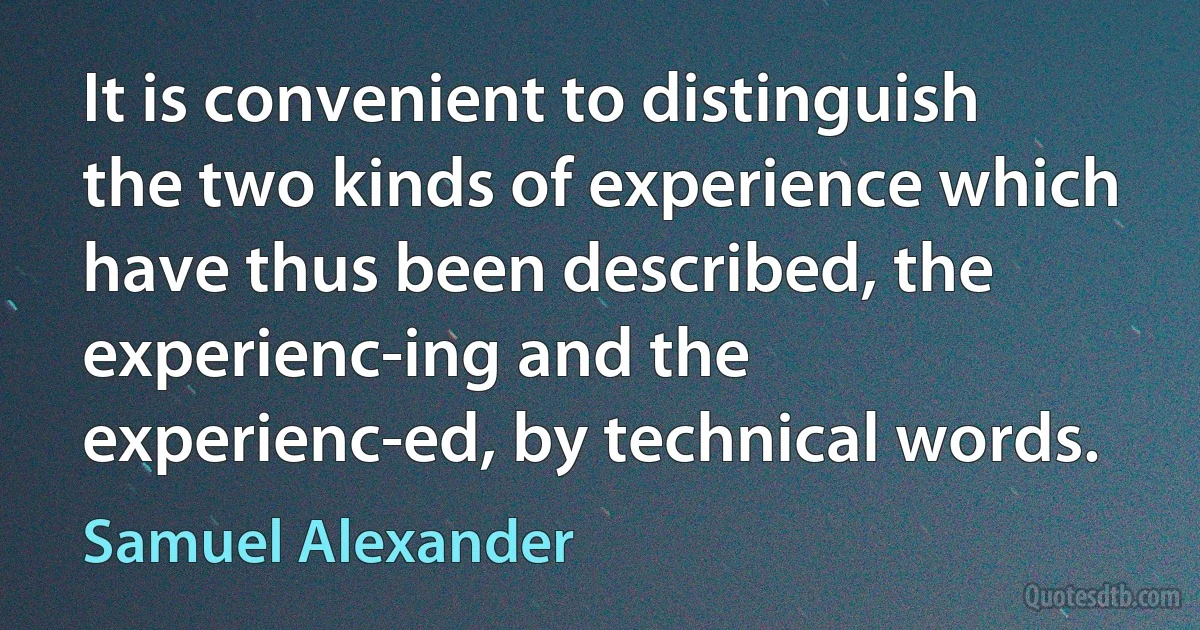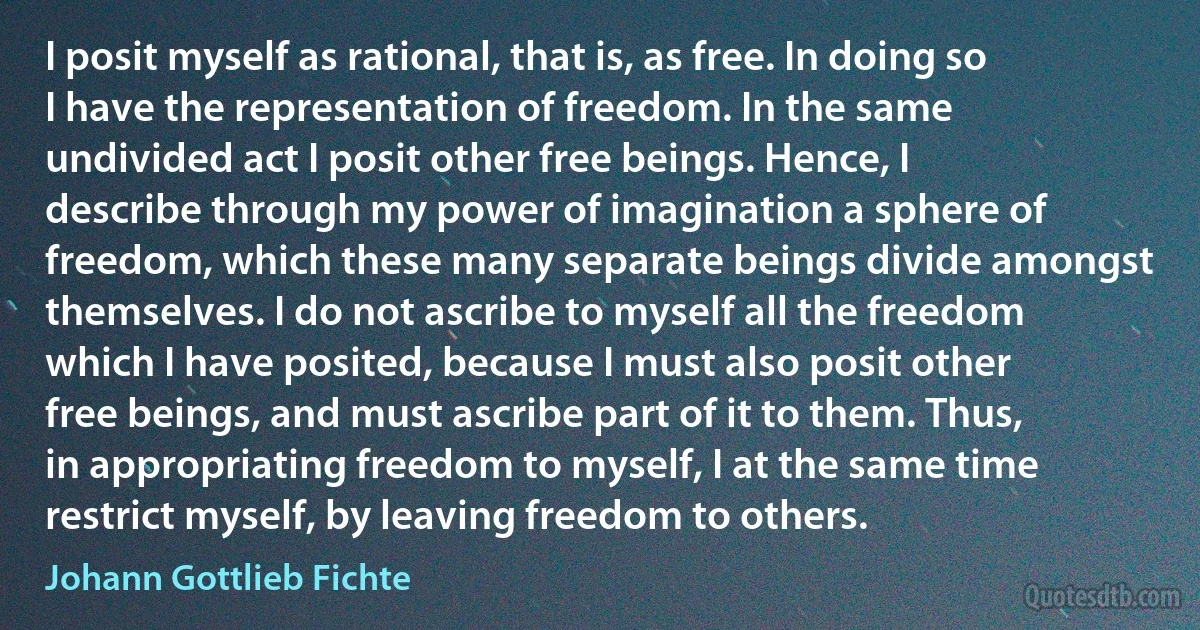Thus Quotes - page 18
One of the lessons learned during the Vietnam War was that the depiction of wounded soldiers, of coffins stacked higher than their living guards, had a negative effect on the viewing public. The military in Iraq specifically banned the photographing of wounded soldiers and coffins, thus sanitizing this terrible and bloody conflict.

Walter Dean Myers
Nor, do I believe in inequalities between human beings. We are all absolutely equal. But equality is of the souls and not the bodies. Hence, it is a mental state. We need to think of, and to assert, equality because we see great inequality in the physical world. We have to realize equality in the midst of this apparent external inequality. Assumption of superiority by any person over any other is a sin against God and man. Thus caste, in so far as it connotes distinctions in status, is an evil.

Mahatma Gandhi
I do not wish to suggest that because we were one nation we had no differences, but it is submitted that our leading men travelled throughout India . . . They learned one another's languages . . . they saw that India was one undivided land so made by nature. They, therefore, argued that it must be one nation. Arguing thus, they established holy places in various parts of India, and fired the people with an idea of nationality in a manner unknown in other parts of the world. Any two Indians are one as no two Englishmen are.

Mahatma Gandhi
How many women thus waste life away the prey of discontent, who might have practised as physicians, regulated a farm, managed a shop, and stood erect, supported by their own industry, instead of hanging their heads surcharged with the dew of sensibility, that consumes the beauty to which it at first gave lustre.

Mary Wollstonecraft
Not only was he ignorant, but he had not even those conditions within himself which made knowledge possible. All that there was developed of him, at present, was a fund of energy, self-esteem, hope, courage, and daring, the love of action, life, and adventure; his life was in the outward and present, not in the inward and reflective; he was a true ten-year old boy, in its healthiest and most animal perfection. What she was, the small pearl with the golden hair, with her frail and high-strung organization, her sensitive nerves, her half-spiritual fibres, her ponderings, and marvels, and dreams, her power of love, and yearning for self-devotion, our readers may, perhaps, have seen. But if ever two children, or two grown people, thus organized, are thrown into intimate relations, it follows, from the very laws of their being, that one must hurt the other, simply by being itself; one must always hunger for what the other has not to give.

Harriet Beecher Stowe
This tendency towards a Christian-European Universal Monarchy has shown itself successively in the several States which could make pretensions to such a dominion, and, since the fall of the Papacy, it has become the sole animating principle of our History. We by no means seek to determine whether this notion of Universal Monarchy has ever been distinctly entertained as a definite plan .... Thus each State either strives to attain this Universal Christian Monarchy, or at least to acquire the power of striving after it;-to maintain the Balance of Power when it is in danger of being disturbed by another; and, in secret, for power, that it may eventually disturb it itself.

Johann Gottlieb Fichte
The determination to print them (his lectures), and to communicate them to the General Public, must also speak for itself; and should it not do so, any other recommendation of them would be thrown away. Thus, with respect to the appearance of this work, I have nothing further to say to the Public, than that I have nothing to say.

Johann Gottlieb Fichte
Spirit: Do not be deceived by sophists and half philosophers; things do not appear to thee by means of any representatives. Of the thing that exists, and that can exist, thou art conscious immediately; thou, thyself, art that of which thou art conscious. By a fundamental law of thy being thou art thus presented to thyself, and thrown out of thyself.

Johann Gottlieb Fichte
What, then, is the animal? First of all, a system of plant-souls. The unity of those plant-souls, which unity nature itself produces, is the soul of the animal. Its world is therefore partly that of the plants - its nourishment, for instance, it receives partly through synthesis from vegetable, and through analysis from animal nature - and partly that of the animals, whereof we shall speak directly. Each product of nature is an organically in-itself completed totality in space, like the plant. Hence, the unknown x which we are looking for must also be such a whole or totality, and in so far it must also have a principle of organization, a sphere and central point of this organization; in short, the same which we have called the soul of the plant, which thus remains common to both. ... The animal is a system of plant-souls, and the plant is a separated, isolated part of an animal. Both reciprocally affect each other.

Johann Gottlieb Fichte
Each citizen of a state promises, in the original compact, that he will promote, as far as lies in his power, all the conditions of the possibility of the state; hence, also, the condition just mentioned. This he can best do by educating children who may grow up to realize various ends of reason. The state has the right to make this education of children a condition of the state-compact, and thus education becomes an external, legal obligation, which the parents owe to the state.

Johann Gottlieb Fichte
I: My consciousness of the object is only a yet unrecognised consciousness of my production of the representation of an object. Of this production I know no more than that it is I who produce, and thus is all consciousness no more than a consciousness of myself, and so far perfectly comprehensible. Am I in the right? Spirit. Perfectly so ; but whence then is derived the necessity and universality thou hast ascribed to these propositions, to that of causality for instance?

Johann Gottlieb Fichte
The administrators of the executive power may be either elective or not; and in the former case all or only some of them may be elective. They are elective in a proper democracy, that is to say, in a democracy which recognizes representation. If all the public officials are directly elected by the whole people, the democracy is a pure democracy; if only some, it is a mixed democracy. The public officials may also fill vacancies themselves; this is the case in a pure aristocracy. But if only some of the magistrates are thus replaced by the public officers, and if the others are again directly elected by the people, then the form of government is that of a democratic aristocracy. A permanent president (monarch) may also be elected to exercise the executive power during his lifetime. In all these cases, either all citizens of the commonwealth, or only some of them, are eligible to office. Eligibility may, therefore, be limited or unlimited.

Johann Gottlieb Fichte
The free being with absolute freedom proposes to itself certain ends. It wills because it wills, and the willing of an object is itself the last ground of such willing. Thus we have previously determined a free being, and any other determination would destroy the conception of an Ego, or of a free being. Now, if it could be so arranged that the willing of an unlawful end would necessarily - in virtue of an always effective law - result in the very reverse of that end, then the unlawful will would always ANNIHILATE ITSELF. A person could not will that end for the very reason because he did will it; his unlawful will would become the ground of its own annihilation, as the will is indeed always its own last ground.

Johann Gottlieb Fichte

![A seeker after Truth cannot afford to indulge in generalisation. Darwin for the greater part of his book Origin of the Species [sic] has simply massed fact upon fact without any theorising, and only towards the end has formulated his conclusion which, because of the sheer weight of testimony behind it, becomes almost irresistible. Yes I have criticised even Darwin's generalisation as being unwarranted. Science tells us that a proposition may hold good in nine hundred ninety-nine cases and yet fail in the thousandth case and thus be rendered untenable as a universal statement. (Mahatma Gandhi)](https://cdn.quotesdtb.com/img/quotes_images_webp/85/mahatma-gandhi-almost-behind-285585.webp)

